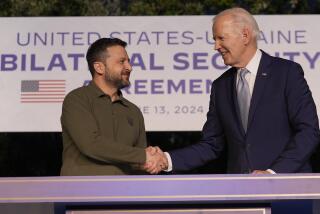U.S., 10 Others Sign Arms-Interdiction Accord
- Share via
PARIS — The United States and 10 other countries signed an accord Thursday outlining steps for uncovering shipments of chemical, biological and nuclear weapons, including boarding ships, forcing suspect planes to land and inspecting cargo.
The agreement, which came at the end of a two-day meeting in Paris, laid out guidelines for increasing cooperation on detecting transfers of weapons, delivery systems and related materials. Part of the U.S. government’s Proliferation Security Initiative, the pact calls for changing national and international laws to strengthen interdiction efforts and share intelligence on weapons movements.
John R. Bolton, U.S. undersecretary of State for arms control, said Washington was especially interested in winning China’s and Russia’s participation. They are not among the 11 members of the accord.
Bolton, in Paris for the meeting and for talks with French officials, said the aim was to stop shipments and to create a deterrent for states or groups considering such shipments.
“While interdiction actions are already a reality, efforts to enhance our collective capabilities for action are essential,” Bolton told reporters at the U.S. Embassy in Paris.
In addition to the United States, the participants are Australia, France, Germany, Italy, Japan, the Netherlands, Poland, Portugal, Spain and Britain.
They will also conduct a series of 10 exercises to prepare for interdictions at sea, on land and in the air, beginning Sept. 13 in the Coral Sea off Australia’s northeast coast.
Bolton said the fruits of such cooperation were apparent in Taiwan’s interception in August of a North Korean-registered vessel and its seizure of 158 barrels of phosphorous pentafulfide, which U.S. officials said is a chemical weapons precursor. The seizure was carried out on the basis of U.S. intelligence.
The upcoming training sessions are “a very clear demonstration that what we’re involved in here is not a diplomatic exercise,” Bolton said.
Bolton rebuffed concerns that the program could give the United States and other countries too much power to stop ships in international waters.
There is “abundant authority” under existing law to conduct interdictions, most of which take place in countries’ territorial waters anyway, he said. In cases in which the legal cover is not clear, participants would attempt to strengthen the laws.
More to Read
Sign up for Essential California
The most important California stories and recommendations in your inbox every morning.
You may occasionally receive promotional content from the Los Angeles Times.










